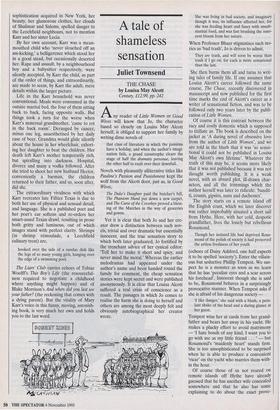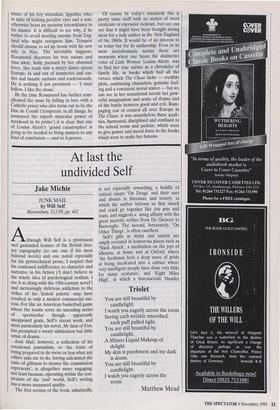A tale of shameless sensation
Juliet Townsend
THE CHASE by Louisa May Alcott Century, £12.99, pp. 242 Any reader of Little Women or Good Wives will know that Jo, the character based so closely on Louisa May Alcott herself, is obliged to support her family by writing dime novels of that class of literature in which the passicSns have a holiday, and when the author's imagi- nation fails, a grand catastrophe clears the stage of half the dramatis personae, leaving the other half to exult over their downfall.
Novels with pleasantly alliterative titles like Pauline's Passion and Punishment kept the wolf from the Alcott door, just as, in Good Wives,
The Duke's Daughter paid the butcher's bill, The Phantom Hand put down a new carpet, and The Curse of the Coverleys proved a bless- ing of the Marches in the way of groceries and gowns.
Yet it is clear that both Jo and her cre- ator drew a distinction between such nov- els, trivial and over dramatic but essentially innocent, and the true sensation story to which both later graduated, Jo fortified by the trenchant advice of her cynical editor: `Tell her to make it short and spicy, and never mind the moral.' Whereas the earlier melodramas had appeared under the author's name and been handed round the family for comment, the cheap sensation stories were kept secret and were published anonymously. It is clear that Louisa Alcott suffered a real crisis of conscience as a result. The passages in which Jo comes to realise the harm she is doing to herself and others are among the most deeply felt and obviously autobiographical her creator wrote.
She was living in bad society, and imaginary though it was, its influence affected her, for she was feeding heart and fancy with unsub- stantial food, and was fast brushing the inno- cent bloom from her nature.
When Professor Bhaer stigmatises such sto- ries as 'bad trash', Jo is driven to admit,
They are trash, and will soon be worse than trash if I go on; for each is more sensational than the last.
She then burns them all and turns to writ- ing tales of family life. If one assumes that Louisa Alcott's career followed the same course, The Chase, recently discovered in manuscript and now published for the first time marks the end of Alcott's career as a writer of sensational fiction, and was to be followed only two years later by the publi- cation of Little Women.
Of course it is this contrast between the racy and cosily domestic which is supposed to titillate us. The book is described on the jacket as 'A daring novel of obsessive love from the author of Little Women', and we are told in the blurb that it was 'so sensa- tional it could not be published in Louisa May Alcott's own lifetime'. Whatever the truth of this may be, it seems more likely that it was not published because it was not thought worth publishing. It is a weak novel, with an absurd plot, ill-drawn char- acters, and all the trimmings which the author herself was later to ridicule: 'bandit- ti, counts, gipsies, nuns and duchesses'.
The story starts on a remote island off the English coast, which we later discover was rather improbably situated a short sail from Hythe. Here, with her cold, despotic grandfather, lives the lonely but rebellious Rosamond.
Though her isolated life had deprived Rosa- mond of the polish of society it had preserved the artless freshness of her youth
(echoes of Daisy Ashford, one half expects it to be spelled `socierty'). Enter the villain- ous but seductive Phillip Tempest. We sus- pect he is a monster as soon as we learn that he has 'peculiar eyes and a scar across his forehead'. Innocent though she is said to be, Rosamond behaves in a surprisingly provocative manner. When Tempest asks if she is afraid of his dangerous society - `I like danger,' she said with a blush, a petu- lant shake of the head and a daring glance at her guest.
Tempest wins her at cards from her grand- father and bears her away in his yacht. He makes a plucky effort to avoid matrimony — 'I hate bonds of any kind, I want you to go with me as my little friend . . . ' — but Rosamond's 'maidenly heart' stands firm. She is too unsophisticated to be surprised when he is able to produce a convenient `vicar' on the yacht who marries them with- in the hour.
Of course those of us not reared on remote islands off Hythe have already guessed that he has another wife concealed somewhere and that he also has some explaining to do about the exact prove- nance of his boy attendant, Ippolito, who, in spite of lacking peculiar eyes and a scar, otherwise bears an uncanny resemblance to his master. It is difficult to see why, if he wishes to avoid meeting anyone from Eng- land who might recognise him, Tempest should choose to set up house with his new wife in Nice. The inevitable happens; Rosamond discovers his true nature and runs away, hotly pursued by her obsessed lover. She leads him a merry dance across Europe, in and out of nunneries and cas- tles and lunatic asylums and confessionals. He is nothing if not persistent — 'I must follow. I like the chase.'
By the time Rosamond has further com- plicated the issue by falling in love with a Catholic priest who also turns out to be the Duc de Conde (`temperate in all things, he possessed the superb muscular power of manhood in its prime') it is clear that one of Louisa Alcott's 'grand catastrophes' is going to be needed to bring matters to any kind of conclusion — and so it proves. Of course by today's standards this is pretty tame stuff with no scenes of overt eroticism or excessive violence, but one can see that it might have been thought strong meat for a lady author in the New England of the 1860s. It would be of no interest to us today but for its authorship. Even in its most melodramatic scenes there are moments when one hears the distinctive voice of Little Women. Louisa Alcott was to find her true métier as a chronicler of family life, in books which had all the virtues which The Chase lacks — credible plots, convincing characters, genuine feel- ing and a consistent moral stance — but we can see in her sensational novels her pow- erful imagination and sense of drama and of the battle between good and evil. Ram- paging out of control all over Europe in The Chase, it was nonetheless these quali- ties, harnessed, disciplined and confined to the school room and parlour, which were to give power and moral force to the books which were to make her famous.











































































 Previous page
Previous page